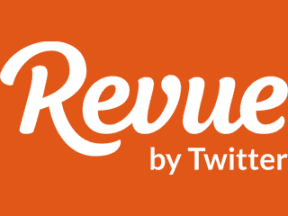Many content creators are masters of Twitter with hundreds of thousands of engaged followers who buy their courses, ebooks, and other products.
For these entrepreneurs, a Twitter profile is a serious communication and sales channel.
This was the point that investor and author Brian Feroldi made in a September 10, 2022, presentation at Fincon, a conference for financial coaches and authors. Feroldi is the founder of Long Term Mindset, an investing newsletter that goes to more than 40,000 subscribers every Wednesday. He also has 358,427 Twitter followers.
Here is a scenario. You’ve written a nearly perfect tweet. Thousands of folks are reading it. Hundreds are clicking to view your Twitter profile. But will the information you provided encourage them to follow?
In this sense, your Twitter profile is the deal closer. If it provides the proper information — text and images — your audience will grow.
According to Feroldi, these are the five things to include.
- Social proof in the header.
- A stand-out profile picture.
- Benefits in the description.
- A newsletter link.
- A quality pinned thread.
Social Proof
Social proof is a psychological phenomenon when people assume the actions of others reflect correct behavior. In other words, if many people are doing something, it must be right. Social proof is one way to influence people’s decisions or at least make them feel at ease.
For Twitter profiles, this means including a header image that “proves” your account is worth following.
Feroldi’s profile image shows his book and includes logos from respected publications, including The Motley Fool, Inc., and Yahoo! Finance.
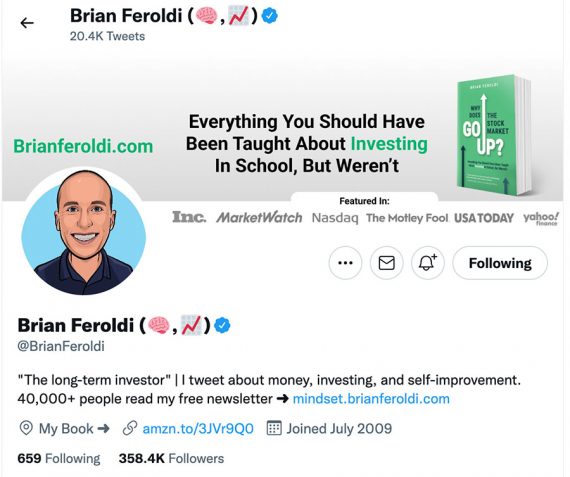
Feroldi’s header image uses his book and respected brands to provide social proof.
Sahil Bloom, an investor, podcaster, and author, uses a picture from his pitching days with Stanford University. The image shows would-be-followers that Bloom is driven and hints at his educational credentials.
If you don’t have a sports image or book, consider featuring your company, a conference you attended, or even impressive architecture you’ve visited.
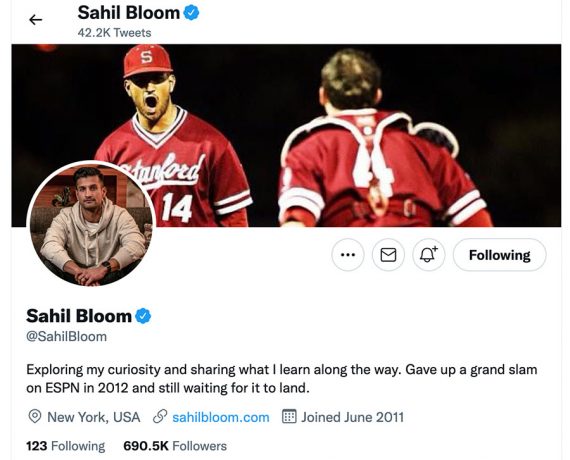
Bloom’s success as a college athlete provides a measure of proof regarding his focus and education.
Profile Picture
Use a professional headshot — Feroldi’s is an illustration — that will make it easy to recognize you and your tweets.
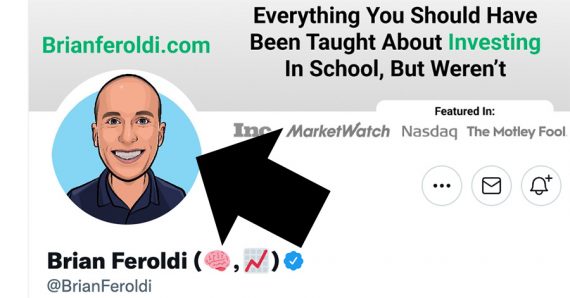
The profile picture should be recognizable and clear, even if an illustration.
Solo-entrepreneur Justin Welsh uses a dramatic and dark profile image for his Twitter account, which has more than 187,000 followers.

Welsh uses a dark profile picture that stands out and makes it easy to recognize him in tweets and comments.
Benefits in the Description
The description or biographical section of the Twitter profile is a mini sales pitch. And like any good pitch, it should focus on the benefits from the potential follower’s perspective.
It needs to answer a fundamental question, “What can folks expect from following you on Twitter?” And it needs to be both clear and concise since profile descriptions have a 160-character limit.
For example, Justin Welsh’s description offers an implied benefit: “Building a portfolio of one-person businesses to $5M in revenue.” The idea is that if you follow him, you might learn how to do the same — build a portfolio of one-person businesses.
A Newsletter Link
Editorial newsletters are an “owned” audience — a direct connection between the publisher and reader.
Feroldi and many other entrepreneurs use newsletters to build an email list. They “own” that list and can use it to generate revenue. Feroldi, for example, uses his newsletter to sell products and publish ads from sponsors.
Marry the idea of owning an audience with Twitter’s Revue newsletter software, and you can place a newsletter link directly in your Twitter profile. If you don’t want to use Revue to send the newsletter, you can easily connect it to other email service providers using Zapier or Pollenate.
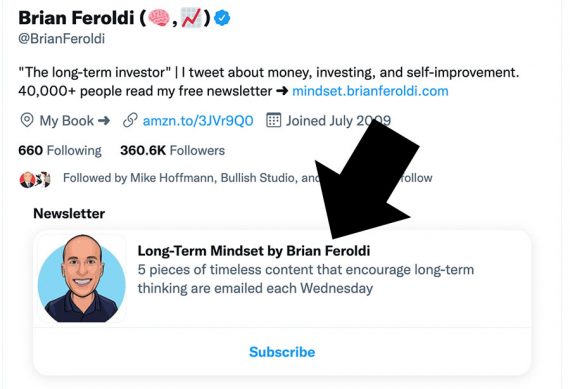
You can collect email addresses directly from your Twitter profile.
A Pinned Thread
A Twitter thread is a powerful way to engage with an audience. It’s an article of sorts — a series of pithy tweets.
Feroldi recommended finding your most successful thread and pinning it with your profile.
Justin Welsh posted a pinned thread describing how one of his solo businesses had passed $1.3 million in revenue.
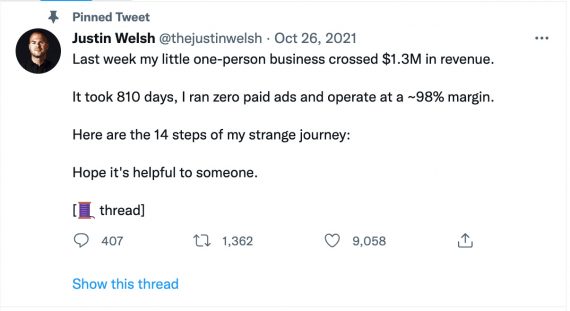
This thread lets potential followers see what they can learn when they follow Welsh.
Sahil Bloom has a pinned thread about decision-making rules, which he calls “razors,” i.e., the Feynman Razor or Occam’s Razor. The thread had more than 98,000 likes, 20,000 retweets, and 2,100 comments at the time of writing.
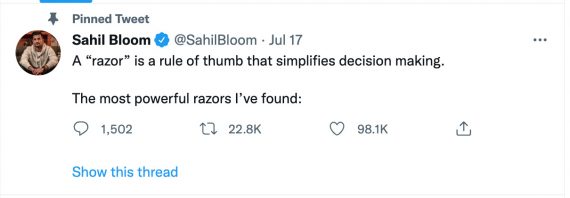
This thread is one of Bloom’s most popular. It lets followers get a taste of his style and content.
—
See Armando Roggio’s follow-up: “Building the Perfect Twitter Thread.”



